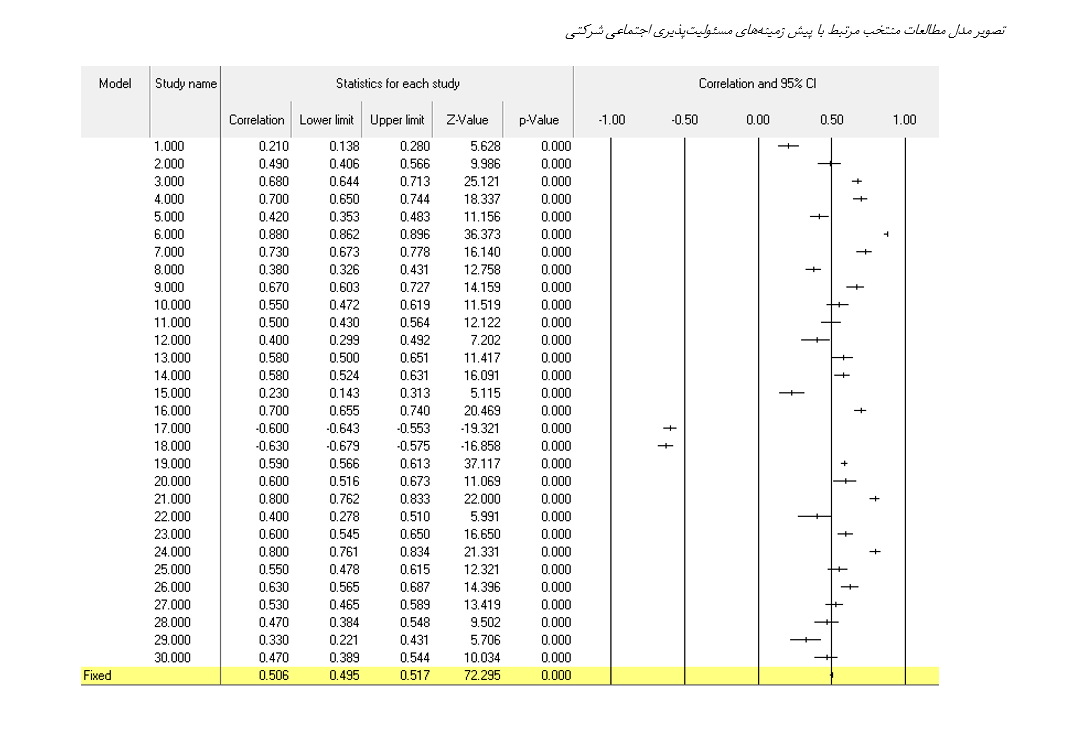Analyzing the Antecedents and Outcomes of Corporate Social Responsibility in Platform-Based Businesses Using the Meta-Analysis Method
Keywords:
corporate social responsibility, background, results, meta-analysisAbstract
Corporate Social Responsibility (CSR), as a key concept in management, investigates how companies interact with stakeholders and the social and environmental impacts of their operations. In platform-based businesses, this concept gains particular significance because such enterprises are directly connected with a large number of users, producers, and other stakeholders. The objective of this study is to examine the antecedents and outcomes of CSR in platform-based businesses. The research method employed in this study is meta-analysis. The software used for statistical analysis was CMA2. The data sources reviewed included scientific websites and academic databases such as Google Scholar, ScienceDirect, and Elsevier. To investigate the antecedents of CSR, a total of 150 articles were reviewed, of which 30 articles were selected for the final meta-analysis. The results indicate that awareness, learning, and organizational culture exhibit the highest correlations with CSR. Regarding the outcomes of CSR, 168 articles were initially reviewed, and 39 were included in the final analysis. Overall, CSR has the most substantial impact on increasing customer loyalty and also contributes to enhancing brand image and employee satisfaction. Corporate social responsibility can strengthen trust and foster positive relationships with stakeholders. Furthermore, CSR initiatives also affect additional costs and reputational risks, although these associations are less pronounced.
Downloads
References
Abbas, J., & Dogan, E. (2022). The impacts of organizational green culture and corporate social responsibility on employees' responsible behaviour towards the society. Environmental Science and Pollution Research, 29, 60024-60034. https://doi.org/10.1007/s11356-022-20072-w
Almahrog, Y., Ali Aribi, Z., & Arun, T. (2018). Earnings management and corporate social responsibility: UK evidence. Journal of Financial Reporting and Accounting, 16(2), 311-332. https://doi.org/10.1108/JFRA-11-2016-0092
Chakroun, S., Ben Amar, A., & Ben Amar, A. (2022). Earnings management, financial performance and the moderating effect of corporate social responsibility: evidence from France. Management Research Review, 45(3), 331-362. https://doi.org/10.1108/MRR-02-2021-0126
Dashe, A. F., Ogenyi, P. M. A., & Prof. Jane, O. M. A. (2024). Female Directorship and Corporate Social Responsibility Disclosure in Nigeria: The Moderating Role of Firm Size. IOSR Journal of Business and Management, 26(11), 10-18. https://doi.org/10.9790/487x-2611041018
Deegan, C. (1995). The Legitimizing Effect of Social and Environmental Disclosures-A Theoretical Foundation. Accounting, Auditing & Accountability Journal, 8(3), 567-586. https://www.emerald.com/insight/content/doi/10.1108/09513570210435852/full/html
Diego, P., Jordi, S., & Josep, A. T. (2018). Are Socially Responsible Managers Really Ethical? Exploring the Relationship Between Earnings Management and Corporate Social Responsibility. Corporate Governance: An International Review, 16(3), 160-177. https://doi.org/10.1111/j.1467-8683.2008.00678.x
Djakman, C. D., & Siregar, S. V. (2024). The Effect of Maturity Learn Element in Enterprise Risk Management and Corporate Social Responsibility on the Level of Digital Transformation. Business Strategy & Development, 7(1). https://doi.org/10.1002/bsd2.346
Donaldson, T., & Dunfee, T. W. (1999). Ties That Bind: A Social Contracts Approach to Business Ethics. Harvard Business School Press. https://books.google.at/books/about/Ties_that_Bind.html?hl=id&id=c71Ti8RuT10C&redir_esc=y
Dyllick, T., & Hockerts, K. (2002). Beyond the Business Case for Corporate Sustainability. Business Strategy and the Environment, 11(2), 130-141. https://doi.org/10.1002/bse.323
Elkington, J. (1994). Towards the Sustainable Corporation: Win-Win-Win Business Strategies for Sustainable Development. California Management Review, 36(2), 90-100. https://doi.org/10.2307/41165746
Espasandín-Bustelo, F., Ganaza-Vargas, J., & Diaz-Carrion, R. (2021). Employee happiness and corporate social responsibility: the role of organizational culture. Employee Relations, 43(3), 609-629. https://doi.org/10.1108/ER-07-2020-0343
Freeman, R. E. (1984). Strategic Management: A Stakeholder Approach. Pitman. https://books.google.at/books/about/Strategic_Management.html?hl=es&id=NpmA_qEiOpkC&redir_esc=y
González-Rodríguez, M. R., Martín-Samper, R. C., Köseoglu, M. A., & Okumus, F. (2019). Hotels' corporate social responsibility practices, organizational culture, firm reputation, and performance. Journal of Sustainable Tourism, 27(3), 398-419. https://doi.org/10.1080/09669582.2019.1585441
Khan, S., Alonazi, W. B., Malik, A., & Zainol, N. R. (2023). Does Corporate Social Responsibility Moderate the Nexus of Organizational Culture and Job Satisfaction? Sustainability, 15(11), 8810. https://doi.org/10.3390/su15118810
Liu, X., & Lin, K. L. (2020). Green Organizational Culture, Corporate Social Responsibility Implementation, and Food Safety. Frontiers in psychology, 11, 585435. https://doi.org/10.3389/fpsyg.2020.585435
Mubushar, M., Rasool, S., Haider, M. I., & Cerchione, R. (2021). The impact of corporate social responsibility activities on stakeholders' value co-creation behaviour. Corporate Social Responsibility and Environmental Management, 28(5), 1576-1590. https://doi.org/10.1002/csr.2168
Muralidhar, L. B., Lakshmi, K. V. N., Swapna, H. R., Rupani, J., Nethravathi, K., Pandey, B. K., & Pandey, D. (2024). Impact of Organizational Culture on The Level of Corporate Social Responsibility Investments: An Exploratory Study. Circular Economy and Sustainability. https://doi.org/10.1007/s43615-024-00371-9
North, D. C. (1990). Institutions, Institutional Change and Economic Performance. Cambridge University Press. https://doi.org/10.1017/CBO9780511808678
Palacios-Manzano, M., Gras-Gil, E., & Santos-Jaen, J. M. (2019). Corporate social responsibility and its effect on earnings management: an empirical research on Spanish firms. Total Quality Management & Business Excellence, 32(7-8), 921-937. https://doi.org/10.1080/14783363.2019.1652586
Porter, M. E., & Kramer, M. R. (2006). Strategy & Society: The Link between Competitive Advantage and Corporate Social Responsibility. Harvard business review, 84. https://hbr.org/2006/12/strategy-and-society-the-link-between-competitive-advantage-and-corporate-social-responsibility
Ruwanti, G., Candrarin, G., Grahita, A., & Assih, P. (2019). Corporate Social Responsibility And Earnings Management: The Role Of Corporate Governance. Humanities & Social Sciences Reviews, 7(5), 1338-1347. https://doi.org/10.18510/hssr.2019.75172
Sial, M. S., Chunmei, Z., Khan, T., & Nguyen, V. K. (2018). Corporate social responsibility, firm performance and the moderating effect of earnings management in Chinese firms. Asia-Pacific Journal of Business Administration, 10(2/3), 184-199. https://doi.org/10.1108/APJBA-03-2018-0051
Siyal, S., Ahmad, R., Riaz, S., Xin, C., & Fangcheng, T. (2022). The Impact of Corporate Culture on Corporate Social Responsibility: Role of Reputation and Corporate Sustainability. Sustainability, 14(16), 10105. https://doi.org/10.3390/su141610105
Strazzullo, S., Mauriello, R., Corvello, V., Cricelli, L., & Grimaldi, M. (2025). How open innovation can improve companies' corporate social responsibility performance? Business Ethics, the Environment & Responsibility, 34(1), 1-16. https://doi.org/10.1111/beer.12535
Übius, Ü., & Alas, R. (2009). Organizational Culture Types as Predictors of Corporate Social Responsibility. Engineering Economics, 61. https://www.researchgate.net/publication/241140589_Organizational_Culture_Types_as_Predictors_of_Corporate_Social_Responsibility
Ziari, R., & Ashrafi, J. (2024). Examining the Impact of the Economic Dimension of Corporate Social Responsibility on Earnings Quality. First International Conference on International Business, Economic Studies, and Humanities.

Downloads
Published
Submitted
Revised
Accepted
Issue
Section
License
Copyright (c) 2025 Reza Tavana (Author); Zohreh Dehdashti shahrokh; Vahid Nasehifar, Kobra Bakhshizadeh Borj (Author)

This work is licensed under a Creative Commons Attribution-NonCommercial 4.0 International License.










